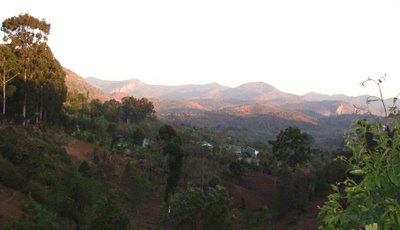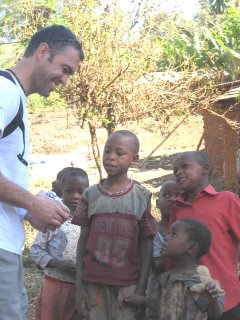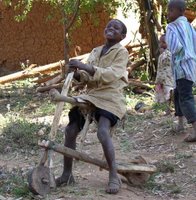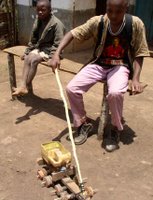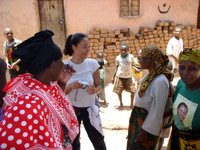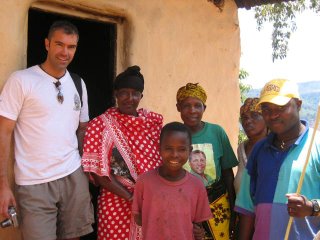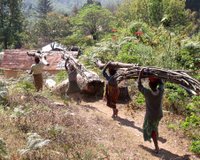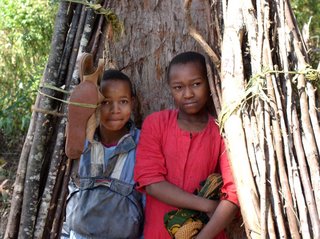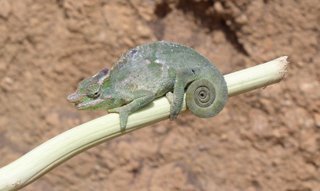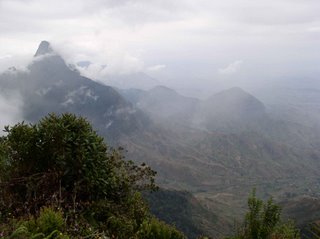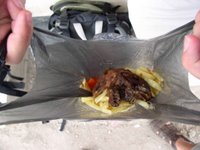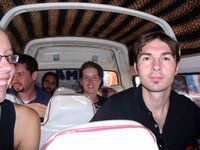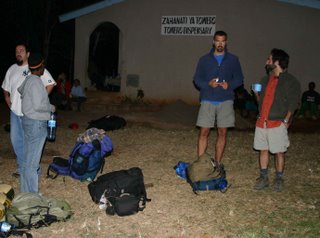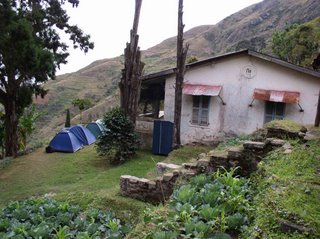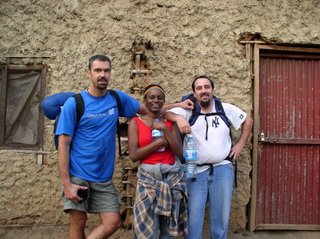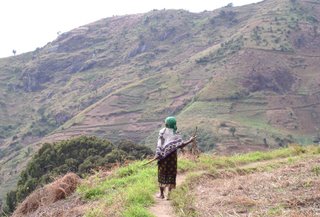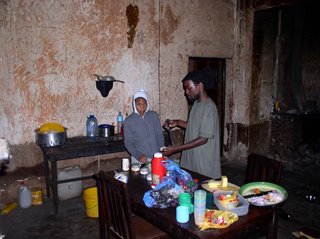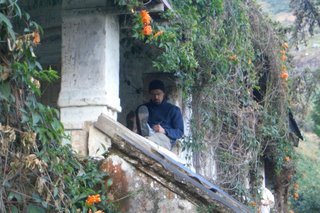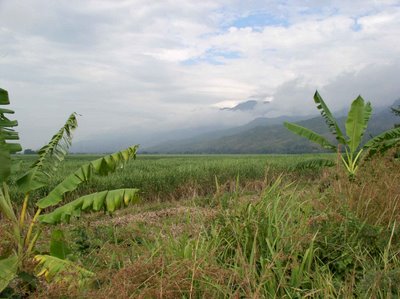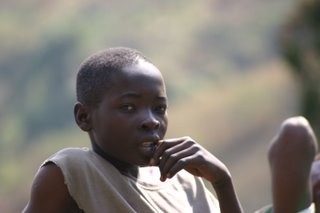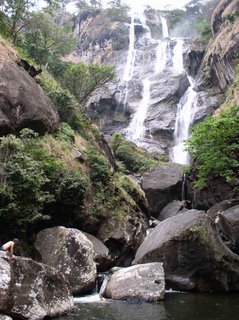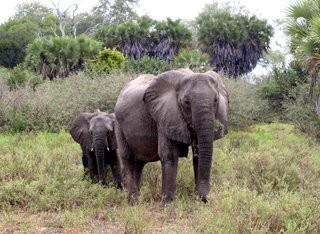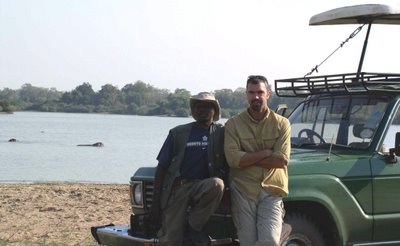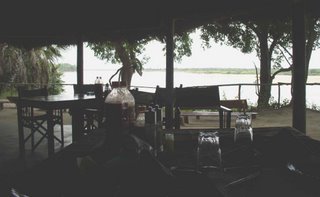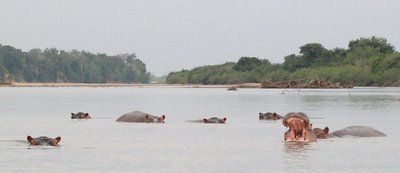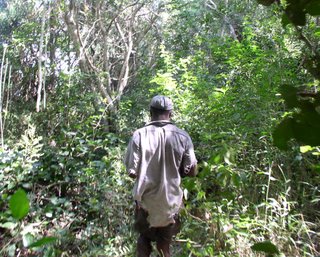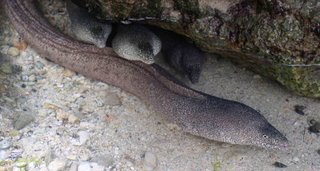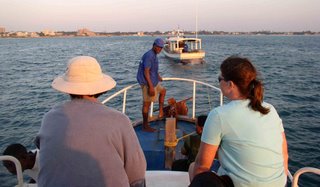Mafia Island, Tanzania
November 4-6, 2005
A short holiday was coming and I needed to come up with something to do that wasn’t too far but something beyond what could be done on a normal weekend. An island off the coast seemed like the thing to do.
 Tanzania has a high percentage of both Muslims and Christians and therefore it recognizes holidays of both religions. That’s good news for me since Harvard has us on the Tanzania schedule rather than the American one. Every November Muslims celebrate Eid al Fitr. It’s the celebration of the end of Ramadan, the holiest time of year according to Islam in which, among other things, Muslims fast for a month during daylight hours. There are a lot of strange things about Eid. One of which is that on Zanzibar during this day men run around pretending to attack each other with banana palm fronds and the women follow singing songs. Par-tay.
Tanzania has a high percentage of both Muslims and Christians and therefore it recognizes holidays of both religions. That’s good news for me since Harvard has us on the Tanzania schedule rather than the American one. Every November Muslims celebrate Eid al Fitr. It’s the celebration of the end of Ramadan, the holiest time of year according to Islam in which, among other things, Muslims fast for a month during daylight hours. There are a lot of strange things about Eid. One of which is that on Zanzibar during this day men run around pretending to attack each other with banana palm fronds and the women follow singing songs. Par-tay.
Another reason it’s strange, and the reason I’m even mentioning this at all, is that the beginning of the holiday is determined by when the local holy man (the imam) first sees the new moon. It affects when you take off work and how many actual days off you get. If he would have seen the new moon on Wednesday night (I really have to force myself not to think of the groundhog and his shadow), we wouldn’t have had to work on Thursday. You don’t know until that evening. We were calling our Muslim friends to find out if we had to work the next morning. We would then have had both Thursday and Friday off. As it turned out, the imam didn’t see his shadow and Thursday was a workday.
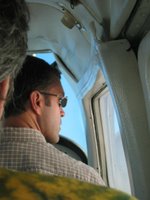 Priya and I booked our flight for Thursday afternoon to be safe so it all worked out. We worked a little over a half day and then hopped in a taxi for the old terminal at the Dar airport where the domestic flights operate. It’s an old building that gives you the feel of the old colonial times. Our small charter plane was delayed from wherever it was coming so we had some time to kill in the rustic old terminal. When the old Cessna 172 finally rolled up to the building, we were ordered to board quickly since the pilot had to make his trip to Mafia Island and back to Dar before sunset and he was running late. The guy looked like he was slightly over 12-years-old so I think it either had something to do with the nature of his pilot’s license or his mom wanted him home before dark.
Priya and I booked our flight for Thursday afternoon to be safe so it all worked out. We worked a little over a half day and then hopped in a taxi for the old terminal at the Dar airport where the domestic flights operate. It’s an old building that gives you the feel of the old colonial times. Our small charter plane was delayed from wherever it was coming so we had some time to kill in the rustic old terminal. When the old Cessna 172 finally rolled up to the building, we were ordered to board quickly since the pilot had to make his trip to Mafia Island and back to Dar before sunset and he was running late. The guy looked like he was slightly over 12-years-old so I think it either had something to do with the nature of his pilot’s license or his mom wanted him home before dark.
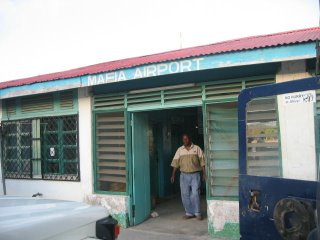 Mafia Island has been on my list of things to do before I leave Tanzania. It’s the southernmost of the three big islands just off the coast that also includes Zanzibar and Pemba. Mafia (nothing to do with Sicily – the name comes from the Arabic word “morfiyeh” which is comparable to “archipelago”) is actually a collection of several small islands that are part of a marine sanctuary that receives special protection from the Tanzanian government. As far as tourism goes, it’s not too developed yet. I imagine that will come before too long but for now it’s pretty rustic.
Mafia Island has been on my list of things to do before I leave Tanzania. It’s the southernmost of the three big islands just off the coast that also includes Zanzibar and Pemba. Mafia (nothing to do with Sicily – the name comes from the Arabic word “morfiyeh” which is comparable to “archipelago”) is actually a collection of several small islands that are part of a marine sanctuary that receives special protection from the Tanzanian government. As far as tourism goes, it’s not too developed yet. I imagine that will come before too long but for now it’s pretty rustic.
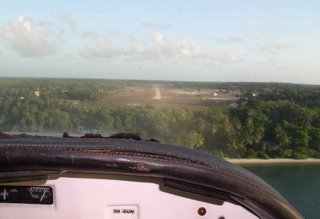 The flight takes a little over a half hour and the youngish white Tanzanian pilot seemed to know what he was doing. As our beat up little plane approached the dirt landing strip, I could see people casually walking across it and some goats grazing in the adjacent grass. It was basically a swath cut through the trees. The pilot set the plane down with impressive grace and we taxied in the swirling dust up to the tiny building that is the Mafia Airport.
The flight takes a little over a half hour and the youngish white Tanzanian pilot seemed to know what he was doing. As our beat up little plane approached the dirt landing strip, I could see people casually walking across it and some goats grazing in the adjacent grass. It was basically a swath cut through the trees. The pilot set the plane down with impressive grace and we taxied in the swirling dust up to the tiny building that is the Mafia Airport.
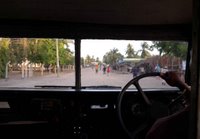 The hotel’s Land Cruiser was thankfully waiting for us and off we went. We passed through the village of Kilindoni – a rather typical rural Tanzanian town but quite charming nonetheless. There are no paved roads on the island but the bumpy drive fortunately only lasted about 20 minutes. We arrived at our hotel, appropriately named the Mafia Island Lodge, and were treated to a fresh coconut with a straw and a flower sticking out of it. We checked in, went to our nondescript room and then had dinner. During dinner we arranged a snorkeling excursion the next day. Some local guys offered us a trip out to a reef in a dhow (handmade wooden boat) complete with a lunch of fish they would catch while we were snorkeling. Sounded good to us. We worked out a price and met them at the beach the next morning at 10am.
The hotel’s Land Cruiser was thankfully waiting for us and off we went. We passed through the village of Kilindoni – a rather typical rural Tanzanian town but quite charming nonetheless. There are no paved roads on the island but the bumpy drive fortunately only lasted about 20 minutes. We arrived at our hotel, appropriately named the Mafia Island Lodge, and were treated to a fresh coconut with a straw and a flower sticking out of it. We checked in, went to our nondescript room and then had dinner. During dinner we arranged a snorkeling excursion the next day. Some local guys offered us a trip out to a reef in a dhow (handmade wooden boat) complete with a lunch of fish they would catch while we were snorkeling. Sounded good to us. We worked out a price and met them at the beach the next morning at 10am.
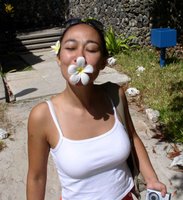 Some other people were there and there ended up being a small group of us on our little half hour trip. We dropped anchor near the reef and we hopped in the warm turquoise water. It was some pretty amazing snorkeling I have to say. I’ve never seen such plentiful and colorful sea life – like swimming in a crowded aquarium except that it was endless. After an hour or two we pulled up on a sandbar and the boys began grilling the white snapper. The rest of us sipped on beers and soda while the hot equatorial sun baked the sand.
Some other people were there and there ended up being a small group of us on our little half hour trip. We dropped anchor near the reef and we hopped in the warm turquoise water. It was some pretty amazing snorkeling I have to say. I’ve never seen such plentiful and colorful sea life – like swimming in a crowded aquarium except that it was endless. After an hour or two we pulled up on a sandbar and the boys began grilling the white snapper. The rest of us sipped on beers and soda while the hot equatorial sun baked the sand.
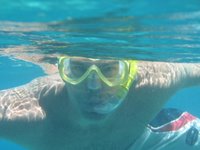 I should probably mention the other group of people who were on the excursion since they ended up coming with us the next day as well. It was a group of goofy Quebecois (I’ve yet to meet someone from Quebec who is normal) speaking their crazy version of French and, well, just being strange. I won’t go into what they do to the French language since that’s unrelated to the rest of this but suffice to say I was captivated by these folks. It was their accent, their behavior, everything. I’ve had some experience with Quebecois from working with a few over a period of a couple of years while in Switzerland (and traveling to Montreal with one for a couple of weeks). I don’t know if it’s from the isolation of feverishly protecting your language and culture or inbreeding or what but as long as you consider them a source of entertainment, you won’t get annoyed. And don’t get me started on Celine Dion.
I should probably mention the other group of people who were on the excursion since they ended up coming with us the next day as well. It was a group of goofy Quebecois (I’ve yet to meet someone from Quebec who is normal) speaking their crazy version of French and, well, just being strange. I won’t go into what they do to the French language since that’s unrelated to the rest of this but suffice to say I was captivated by these folks. It was their accent, their behavior, everything. I’ve had some experience with Quebecois from working with a few over a period of a couple of years while in Switzerland (and traveling to Montreal with one for a couple of weeks). I don’t know if it’s from the isolation of feverishly protecting your language and culture or inbreeding or what but as long as you consider them a source of entertainment, you won’t get annoyed. And don’t get me started on Celine Dion.
So anyway, it was a nice relaxing day. It really is an amazing place with the color of the water, the coconut trees, the white sand, etc. The East African coast is loaded with one tropical paradise after another, most of them largely undiscovered. We were pretty happy with this one.
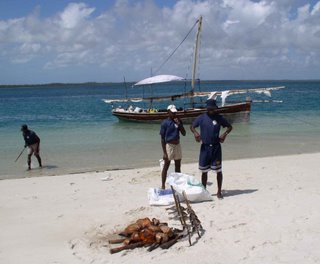 After eating we hopped back on the boat and returned to the hotel, showered, had dinner, and planned the excursion for the next day. The plan for Saturday turned out to be similar except we went quite a ways south of the island to a sandbar surrounded by incredible reefs. It was by far the best snorkeling I’ve ever done. Priya had recently purchased an underwater case for her camera so she was anxious to try it out. Pretty cool to be able to capture underwater stills and video.
After eating we hopped back on the boat and returned to the hotel, showered, had dinner, and planned the excursion for the next day. The plan for Saturday turned out to be similar except we went quite a ways south of the island to a sandbar surrounded by incredible reefs. It was by far the best snorkeling I’ve ever done. Priya had recently purchased an underwater case for her camera so she was anxious to try it out. Pretty cool to be able to capture underwater stills and video.
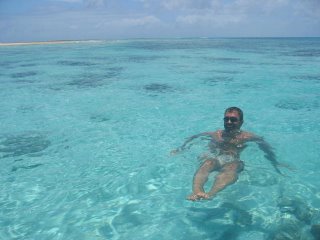 We were going to have lunch in the same manner as the day before but the tide rose more quickly than our guides had anticipated. Little by little the sandbar began to disappear as people scurried to gather belongings, towels and so forth. Soon the wood and coconut hull fire that had been cooking our snapper fell victim to the waves. The Tanzanian in charge saved the fish but to no avail since they were yet uncooked. Everyone pitched in to load the dhow as quickly as possible in the relentless rising tide, carrying things above our heads and tossing them aboard. As we pulled away from what was left of the sandbar, the unfazed Tanzanian crew of three began to prepare the sail for the return trip.
We were going to have lunch in the same manner as the day before but the tide rose more quickly than our guides had anticipated. Little by little the sandbar began to disappear as people scurried to gather belongings, towels and so forth. Soon the wood and coconut hull fire that had been cooking our snapper fell victim to the waves. The Tanzanian in charge saved the fish but to no avail since they were yet uncooked. Everyone pitched in to load the dhow as quickly as possible in the relentless rising tide, carrying things above our heads and tossing them aboard. As we pulled away from what was left of the sandbar, the unfazed Tanzanian crew of three began to prepare the sail for the return trip.
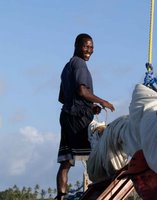 One interesting thing about a dhow is that all the parts are handmade including the wood-carved pulleys. Going from motor to sail is pretty interesting for a sailing layperson but to a seasoned veteran like my brother it would have certainly been much more fascinating.
One interesting thing about a dhow is that all the parts are handmade including the wood-carved pulleys. Going from motor to sail is pretty interesting for a sailing layperson but to a seasoned veteran like my brother it would have certainly been much more fascinating.
On the way back to the main island, we stopped by Jibondo Island. It’s a small island that has around 2,000 inhabitants, who, according to our guide, don’t leave the island that much. It’s an interesting place in that it has no water. No wells. Completely dry. They can’t even make mud to build their huts. They have ingenious ways of capturing rainwater during the rainy season that they use for everything except drinking most of the year. All the water they drink has to be brought in from Mafia.
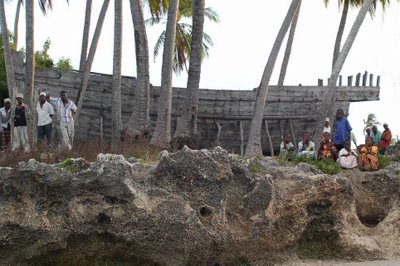 The folks weren’t overly welcoming, largely because there aren’t any shops or any way to spend money. In other words they had nothing to gain by our presence. We spent a whole 20 minutes or so walking around (bothering) the main village before we turned around and headed back to the dhow. Our annoyance to the villagers was exacerbated by the chief of the Quebecois tribe who decided to do a little dance and walk around with seaweed in his hair. It seemed to amuse primarily his own tribe and I was sensing the damage being done to the white race in the presence of a people who have limited exposure to non-Tanzanians. We couldn’t board our boat fast enough and I was happy to get back to the main island.
The folks weren’t overly welcoming, largely because there aren’t any shops or any way to spend money. In other words they had nothing to gain by our presence. We spent a whole 20 minutes or so walking around (bothering) the main village before we turned around and headed back to the dhow. Our annoyance to the villagers was exacerbated by the chief of the Quebecois tribe who decided to do a little dance and walk around with seaweed in his hair. It seemed to amuse primarily his own tribe and I was sensing the damage being done to the white race in the presence of a people who have limited exposure to non-Tanzanians. We couldn’t board our boat fast enough and I was happy to get back to the main island.
Being a foreigner (“mzungu”) is something that I constantly grapple with here. The reference used to refer exclusively to 19th century European explorers, missionaries and colonialists since they were the only non-Africans here. Now it sort of refers to foreigners in general and has somewhat of an economic connotation. I’ve even heard it used in reference to African Americans that are traveling or working here. I should mention that the famous Maasai tribe allegedly used a different word that fortunately didn’t stick. The term “iloridaa enjekat” was inspired by the sight of strange trouser-wearing invaders. It literally meant “those who confine their farts”. Funny guys those Maasai.
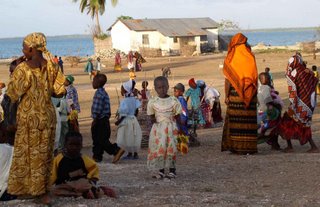 That evening was very nice but uneventful. We did have a walk along the beach taking advantage of a completely lightless environment to stargaze. They don’t call this the Dark Continent for nothing. It was an amazing sky full of southern hemisphere stars and constellations I don’t recognize yet. I should also say that it was a nice change to be on a safe beach at night. In Dar you’d never venture out on a casual walk along the beach at night like that.
That evening was very nice but uneventful. We did have a walk along the beach taking advantage of a completely lightless environment to stargaze. They don’t call this the Dark Continent for nothing. It was an amazing sky full of southern hemisphere stars and constellations I don’t recognize yet. I should also say that it was a nice change to be on a safe beach at night. In Dar you’d never venture out on a casual walk along the beach at night like that.
We flew back to Dar the next afternoon. It was a particularly enjoyable weekend and another great African experience. I may sneak in one more adventure before heading to the States for the holidays. We’ll see.
